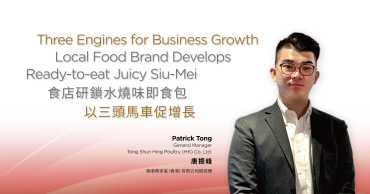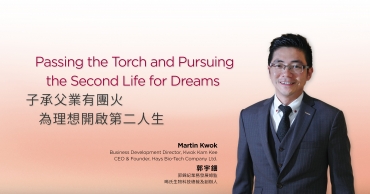
Hong Kong Catering Giant Unveils Formula in Defying the Market Gloom – “Charge, Cope and Change”
The Hong Kong food service industry is facing headwinds from local consumers’ increased fondness for day-trips across the border and a surge of outbound travel. While most caterers are playing defence until the storm pasts, Hong Kong’s leading food chain, Café de Coral Group (CdC) stays proactive and positive of the future. The optimism is fuelled by a number of factors: its multi-brand strategy, strong performance in the mainland market, and optimisation of its procurement and management processes through technology and data-driven approaches.
“We focus on being agile, which means being able to seize opportunities (charge), shield from risks (cope), and adapt in different market situations (change). For example, we are launching an upgraded version of mobile app to boost sales, enhancing work processes to improve efficiency, and at the same time cultivating a ‘breakfast and afternoon tea culture’ in the mainland cities. I believe only a multifaceted approach can continue to drive our growth,” said Piony Leung, CEO of Café de Coral Group.
Dining Culture: Guangdong versus Hong Kong
The Group's three main business lines - quick-service restaurant, casual dining, and institutional catering - all posted a year-on-year revenue growth during the fiscal year 23/24. Besides its 380 stores in Hong Kong, it has achieved a record high of 171 stores in the mainland with 18 new stores opened in the past year.
With over 30 years of presence in the mainland market, Piony explained how Guangdong customers are different from Hongkongers in their dining habit, “In the mainland, breakfast is simply fried dough sticks and soy milk, while afternoon tea is uncommon. Whereas in Hong Kong, the ‘breakfast, lunch, tea, dinner’ dining culture is vibrant. We serve meals throughout the day, with breakfast to the commuters and retirees, lunch and afternoon tea to the white collars, blue collars and students after school hours.”
“But the integration within the Greater Bay Area has presented an excellent opportunity for us. We are actively introducing the Hong Kong dining culture to cities like Foshan and Guangzhou. With menus tailored to local tastes, we encourage parents to enjoy a big breakfast in a comfy setting after sending their children to school, or friends in the neighbourhood to gather leisurely for afternoon tea. We are striving to make this cultural shift happen.”



Go Digital
When it comes to addressing customer behavioural changes and enhancing operational efficiency, Piony believes digitalisation is the key. CdC Fast Food recently launched an upgraded version of the mobile app “Club 100”, which has attracted over 1.7 million registered users to date. New members can enjoy e-coupons worth over HK$600 upon registration to enable functions including one-stop mobile pre-ordering, meal ordering for dine-in/takeaway, collecting reward points, accessing eatCDC eCommerce platform, and making orders for mooncakes and other festive foods. In turn, the Group leverages the real-time data to better grasp consumer trends.
“We have also installed over 800 self-ordering kiosks and over 250 food delivery robots in our stores across mainland China, Hong Kong and Macau. These initiatives not only help us provide more efficient customer services, ease the workload of frontline staff, but also add fun to the overall dining experience. They are not meant to take away jobs: some cashiers have transitioned to other positions in the kitchen or the siu mei section, and they enjoy their new roles while learning new skills.”
Seeing the Big Picture, Acting in Detail
Technology has done wonders for CdC in terms of alleviating manpower shortage, controlling costs and boosting productivity, which partly contributed to the Group's gross profit margin risen to 11.4% in 23/24 from 8.8% in the previous year. Piony is now focusing on digitalisation and streamlining work processes at the stores, central processing plants and back offices. GS1 HK’s ezTRADE platform, a B2B digital trade community, and Smart Operation Solution are some of the initiatives that have been in place. The former provides a unified system for different suppliers to receive orders and issue invoices, enhancing efficiency for both outlets and suppliers. The latter solution is essential to central food processing: previously the staff would cut the raw meat upon delivery into meal portions, but variations in bone quantity and fat content could affect the final number of meals supplied by each shipment. Now, CdC has established standard portions and procedures, introduced electronic scales and spreadsheets to accurately record quantities of divisible meat and time required for the process. The new system has not only increased sellable meat volume, improved cost control, ensured stable numbers of meal output, it also aligns with the CdC sustainability goals by boosting productivity and reducing food waste.

“Nothing is too insignificant for us to address. Our management team regularly visit our work sites to pinpoint and rectify any issues. Participation and opinions of our staff are key, that is why we launched the “Have Your Say” initiative to regularly gather feedback from staff, which successfully led to the formulation of schemes to reduce costs. For instance, a colleague once noted that the wonton wrappers from a supplier were too moist, causing excessive usage and wastage when making wontons. We acted on it quickly, resulting in a significant increase in production and efficiency. Minor tweaks in raw material, staffing, and food quality management can all play a pivotal role in the seamless functioning of a food chain that serves hundreds of thousands of meals each day.”
Promoting Sustainability
Food safety is fundamental to catering businesses. For 6 consecutive years, CdC has received the top award – Diamond Award - from the GS1 HK Quality Food Scheme, which not only exemplifies its high standards in food safety but also excellence in areas including food traceability, employee health and hygiene management.
The Group's sustainability goals also pertain to its customers, employees, and the environment. A series of environmental indicators were set in 2021 focusing on food waste reduction, water and energy conservation, and carbon reduction, which has all been met in 2023/24 ahead of schedule. The recycling rate of food waste from its operations has also been increased to 40% in the same year. In response to the global call on plastic reduction, all of the Group’s outlets has discontinued the use of disposable plastic cutlery in April 2024, while $1 will be charged on takeaway customers opting for non-plastic disposable cutlery. Since the introduction of this measure, 90% of the takeaway customers choose not to purchase disposable cutlery, indicating a success in waste reduction.



“To achieve these goals, we must mobilise all our staff: clearly communicate our goals and provide appropriate tools to them. This involves taking small steps like moving the scale in the kitchen to the ground to make it easier for staff to weigh the heavy food waste every day; it is also important to recognise outstanding performance in order to boost participation to these sustainable work practices. As such, we have already surpassed our four key ESG targets this year in reducing GHG emissions, energy and water consumption, and food waste,” said Piony.

Supported 7,000 Underprivileged in 2 Years
The Group’s “Bon Appétit Café” food assistance programme has been launched for two years now. With a total funding of HK$24 million, the programme has supported 7,000 individuals, including single parents, elderlies living alone, caregivers of patients and etc. Unlike typical food distribution programmes, CdC relies on its community partners to identify the needy and distribute HK$3,000 voucher cards to them. Beneficiaries can redeem meals of their choice at CdC anytime, avoiding scenes of long queues usually seen at food distribution events.
In the 2024 AC Nielsen mystery shopper survey, the Group received a record-high score, which Piony attributed to their “Happy Employees = Happy Customers” ethos.
“We set up the Lo Tang Seong Education Foundation in 1999 to provide university tuition subsidies to eligible staff members’ children, which had supported 766 employees to date. We also believe in creating a diverse and inclusive community, and have currently employed over 600 colleagues from ethnic minority backgrounds or with disabilities.”



“Assuming the role of CEO in April this year, Piony has been actively revitalising the brand and streamlining costs concurrently, aiming to reinforce its leading position in a fast changing market. The Group's strategic approach, characterised by its ability to "charge, cope and change" infuses the business with energy and resilience, enabling it to not only survive but thrive for over 56 years and beyond.”



